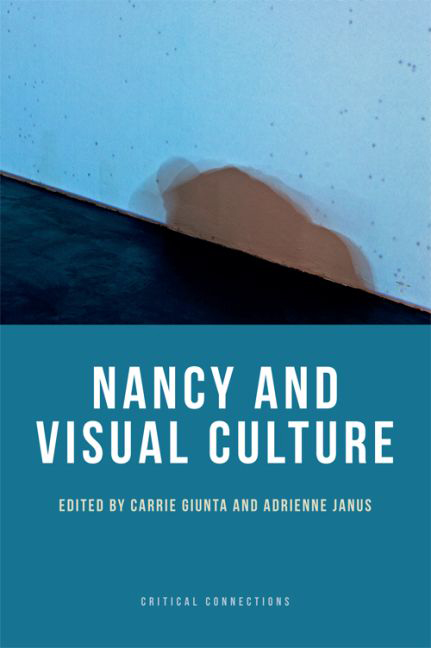Book contents
- Frontmatter
- Contents
- List of illustrations
- Acknowledgements
- Introduction: Jean-Luc Nancy and the Image of Visual Culture
- 1 Cutting and Letting-Be
- 2 Dancing Equality: Image, Imitation and Participation
- 3 A Question of Listening: Nancean Resonance, Return and Relation in Charlie Chaplin
- 4 The Image: Mimesis and Methexis
- 5 On the Threshold: Visual Culture, Invisible Nature
- 6 Pornosophy: Jean-Luc Nancy and the Pornographic Image
- 7 Presentation and Disappearance: Dialogue between Soun-Gui Kim and Jean-Luc Nancy
- 8 Writing in the Place of the Animal
- 9 Together at the Limit: Jean-Luc Nancy, Art and Community
- 10 Turning Around the Written Mark, Opening from a Weight of Thought
- 11 Uncanny Landscapes of Photography: The Partage of Double-Exposure after Jean-Luc Nancy
- Contributors
- Bibliography
- Index
11 - Uncanny Landscapes of Photography: The Partage of Double-Exposure after Jean-Luc Nancy
Published online by Cambridge University Press: 15 September 2017
- Frontmatter
- Contents
- List of illustrations
- Acknowledgements
- Introduction: Jean-Luc Nancy and the Image of Visual Culture
- 1 Cutting and Letting-Be
- 2 Dancing Equality: Image, Imitation and Participation
- 3 A Question of Listening: Nancean Resonance, Return and Relation in Charlie Chaplin
- 4 The Image: Mimesis and Methexis
- 5 On the Threshold: Visual Culture, Invisible Nature
- 6 Pornosophy: Jean-Luc Nancy and the Pornographic Image
- 7 Presentation and Disappearance: Dialogue between Soun-Gui Kim and Jean-Luc Nancy
- 8 Writing in the Place of the Animal
- 9 Together at the Limit: Jean-Luc Nancy, Art and Community
- 10 Turning Around the Written Mark, Opening from a Weight of Thought
- 11 Uncanny Landscapes of Photography: The Partage of Double-Exposure after Jean-Luc Nancy
- Contributors
- Bibliography
- Index
Summary
Realist accounts have traditionally contrasted the expressive originality of painting and portraiture with the essentially objective, documentary character of photography. Yet photography does not merely reproduce and frame the familiar, whether a beautiful face or a picturesque landscape. It may also estrange and contest those bodies whose indexical traces it presents as deferred.
Photography can challenge assumptions surrounding ‘landscape’ as an inert backdrop against which cultural work takes place, gesturing instead towards emergent forces of co-composition. This notion is particularly important to my own photographic practice. In this chapter, I will draw my Time Out of Joint series of double exposures into dialogue with the thought of Jean-Luc Nancy. If, for Nancy, ‘[Art] touches on the living integration of the sensuous’, and ‘isolates the exteriority and exposition of a being in the world’, modes of production are themselves always implicated in multiple worlds. The photograph thus implies a doubling of exposure: the co-appearance of multiple traces in the distension of each singular, discrete image.
My intention here is not to produce an authoritative account that would promote a notion of ownership over this work. I will instead discuss how irreconcilable gaps take place ‘between the producer and the produced, and thus between the producer and himself’, emphasising, with Nancy, my complicity with other material forces that co-compose these hallucinatory bodies of photography ‘detached and removed by the film’.
Analogue mediality: the doubling of the ground
My Time Out of Joint series was produced using an entirely analogue process. By choosing to use film, a photographer involves herself in a contemporary questioning of ontological or realist discourses that contend the notion of photography as a medium with a direct or indexical connection to the referent. The use of film allows us to reflect upon the resistant graininess of a chemical medium, while also acknowledging the anachronistic and hauntological repercussions of such a gesture in digital times.
Nancy muses upon the materiality of film as an emulsion in the essay ‘Lux Lumen Splendour’ from Multiple Arts: The Muses II. In his fragmentary account, the photograph becomes the place where the suspension of an originary light, lux, takes place. The photographic image becomes a suspended passage where lumen, ‘the secondary or incidental light in the translucency of surfaces or bits of matter’ is ‘reflect[ed] and refract[ed]’.
- Type
- Chapter
- Information
- Nancy and Visual Culture , pp. 199 - 214Publisher: Edinburgh University PressPrint publication year: 2016



